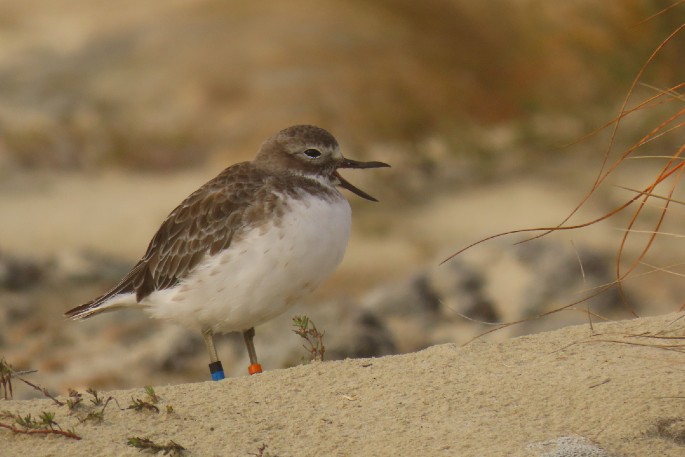This Content Is Only For Subscribers
Donations from people all over New Zealand are helping efforts to keep pukunui/southern New Zealand dotterel on the planet.
Pukunui are the world’s rarest wading bird. A year ago, there were just 101 left on Earth.
This year, flock counts showed a population increase of four birds bringing the total to 105.
It’s a small lift, but hugely significant, says DOC pukunui ranger Dan Cocker.
“Pukunui only breed on Rakiura/Stewart Island and some of them migrate to Awarua Bay in Southland to feed. If they don’t survive in these places, they’ll be gone for good.”
Pukunui numbers have fluctuated over the past 30 years due to different predators, but especially feral cats. The population hit an all-time low of 62 birds in 1992 and bounced back to 290 after intensive predator control in 2009, before rapidly declining again despite continued pest control efforts. DOC has a dedicated ‘Pukunui Recovery Team’ who work hard on bird monitoring, banding, and predator control at breeding sites and surrounding areas.
“We’re thrilled the April flock counts showed a population increase,” says Dan, “But 105 is still a perilously low number for this one-of-a-kind bird. We can’t take our foot off the gas.”
In 2023 the New Zealand Nature Fund launched a campaign in partnership with DOC to raise funds from donors to support DOC’s Pukunui Recovery Team to protect pukunui from predators.
NZ Nature Fund CEO Sarah Lyttle says more than 600 people have already contributed to the pukunui campaign with more than $400,000 raised to date including $200,000 from an anonymous party and $20,000 from the Southland branch of Forest and Bird.
DOC has used funds from these donations to boost the Pukunui Recovery Programme by employing additional trappers to target feral cats at nest sites, adding cameras around key breeding sites to monitor feral cat numbers, buying extra feral cat kill traps, and supporting more helicopter flights to monitor remote pukunui nesting sites.
“Enabling people to invest directly in projects that prevent extinction is our mission and it’s wonderful our donors have made a very tangible difference to the pukunui this season,” says Sarah.
“I hope this encourages more Kiwis to dig deep and invest directly in this precious endangered species.”
“Donations to New Zealand Nature Fund’s campaign boosted our ground trapping efforts, resulting in 64 feral cats being trapped across our predator control zones, that’s almost double what we caught last season,” says Dan.
“While the extra trapping efforts have benefited pukunui, we’re barely holding the line for this species. We need to control feral cats across a much larger area where pukunui breed.”
DOC is currently considering a proposal for an aerial 1080 operation to protect nesting pukunui ahead of the 2025/26 breeding season. The goal of the Pukunui Recovery Team is to increase pukunui numbers to at least 300 birds by 2035.
“We still have a long way to go to reach this goal,” says Dan.
“The good news is if we work together, we can create safe havens for our taonga species by removing pests and restoring ecosystems.”



